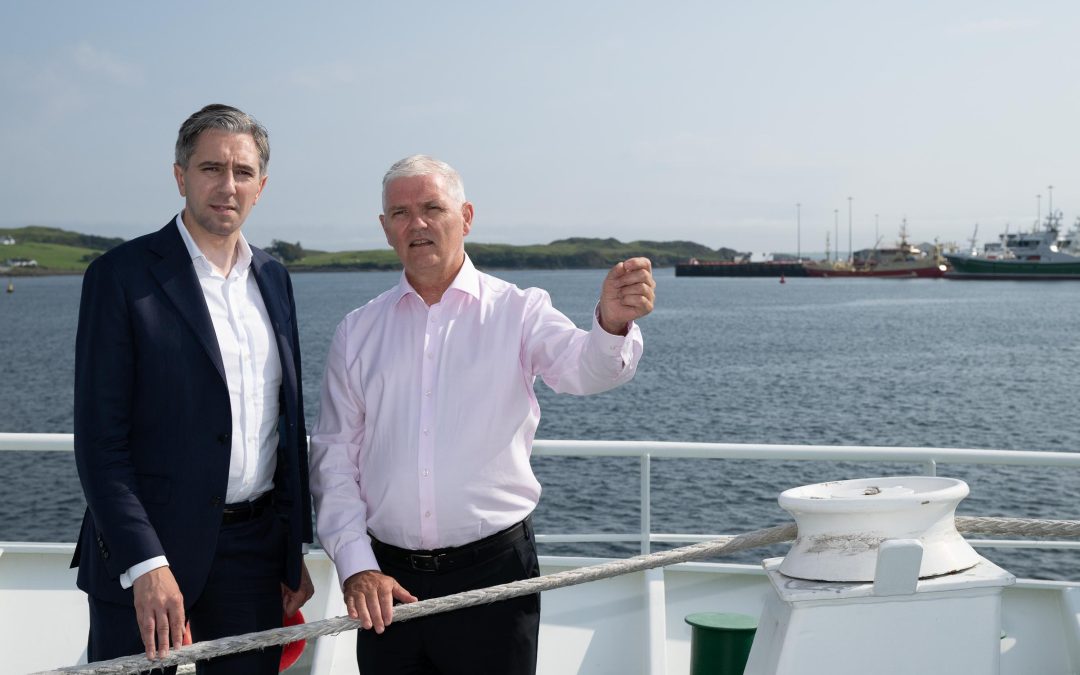By Aodh O Donnell, Chief Executive of the Irish Fish Producers Organisation (Written for The Skipper)
This month’s visit of Tánaiste Simon Harris TD to Killybegs was far more than a formality — it marked a significant moment of recognition for Ireland’s fishing industry and communities at the highest level of government. For the first time in years, a Tánaiste not only met fishing representatives in port but also went to sea aboard the Western Chieftain to witness the reality of the industry first-hand. That kind of engagement matters — and it opens the door to real change.
For decades, we have highlighted the fundamental unfairness of EU fisheries policy. Ireland controls 12% of EU waters yet receives less than 6% of quotas. That imbalance costs jobs, drains coastal towns, and weakens communities. The Brexit agreement stripped 26% of our mackerel quota — hitting Killybegs harder than anywhere else in Europe. That loss is still deeply felt.
During the visit, Dominic Rihan of the KFO described the meeting as an opportunity to discuss both challenges and potential. Senator Manus Boyle, long a champion of this sector, thanked the Tánaiste for delivering on his promise to visit Killybegs and said what we have long felt: our political leaders need to see our industry up close. Fishing has been the backbone of Killybegs for generations — and with the right policies, it can remain a driver of jobs and prosperity for decades ahead.
Future threats were also discussed, alongside the need for ongoing cooperation to enhance the national and international attractiveness of Irish ports such as Killybegs.
On fishing opportunities, everyone agreed that, unless Ireland fights its corner in Brussels, we will be sidelined again. This means larger mainland European and Norwegian fleets will continue taking the lion’s share at our expense.
As industry representatives, we left this meeting encouraged. There was a broad industry consensus that resilience must be central to achieving sustainability. Having listened intensely, the Tánaiste gave a pledge to “see what more we can do to increase our presence in Brussels… putting forward the case for the Irish fishing industry and ports like Killybegs.” He also gave a commitment to ‘having structured regular engagement’ with industry leaders.
Future Potential for Ireland’s Fishing Industry
Importantly, there was a recognition of the strategic importance of the fisheries sector. It produces sustainable, high-quality food with one of the lowest carbon footprints of any protein. Its role in food security, exports, and sustaining coastal economies was acknowledged at the highest level. That matters — it shows Government is listening.
Collectively, we emphasised the opportunities ahead: Ireland has some of the richest fishing grounds and world-class vessels and infrastructure. Our products are of the highest quality and are prized and valued in international markets. And yet, other European — and even non-EU — countries often benefit from greater access to Irish waters than we do. Why not Ireland? With strong advocacy, quota reform, and investment, we can revive underutilised vessels, ports and processing plants. With the support of government, we can sustainably fish our fishery resources, protect a maritime heritage, secure long-term jobs, and grow exports sustainably.
For too long, the Common Fisheries Policy has been driven by politics, not fairness or science. That must change. We hope this visit marks a reset in how Government engages with fishing communities. The tide can turn — but only if Ireland defends its fishing communities as firmly as other EU nations defend theirs.
This visit is a clear signal of an all-of-government commitment to the sector in line with the Programme for Government. The industry stands ready to work with Government to build a fairer, stronger, and more sustainable future.

